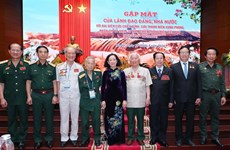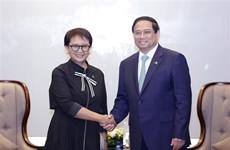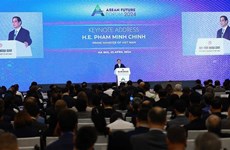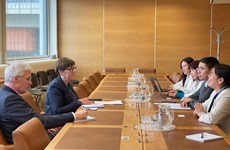Party Congress mulls over intensive international integration
Pham Binh Minh, member of the 11th Party Central Committee and Deputy Prime Minister and Foreign Minister, delivered a report on deepening international integration.
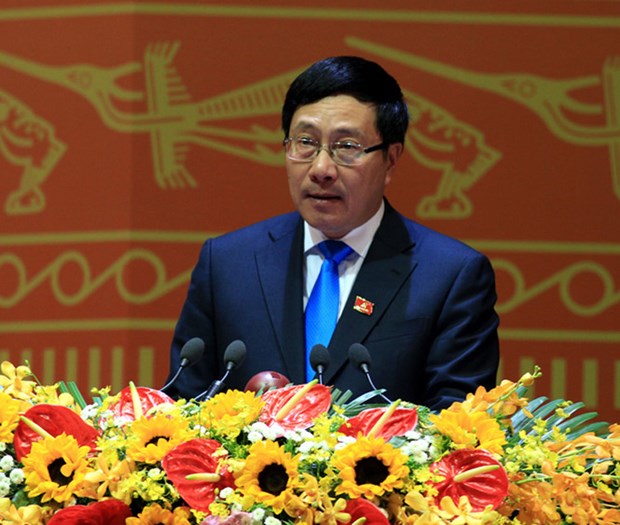 Pham Binh Minh, member of the 11th Party Central Committee and Deputy Prime Minister and Foreign Minister, delivers a report at the 12th National Party Congress on January 23 (Source: VNA)
Pham Binh Minh, member of the 11th Party Central Committee and Deputy Prime Minister and Foreign Minister, delivers a report at the 12th National Party Congress on January 23 (Source: VNA)In his report, the official pointed to the complicated situations of the world and the region, which, he said, has affected Vietnam’s national security and development.
Against the backdrop, the country has actively and synchronously carried out foreign relation work while pooling strength of the Party’s external affairs, the State’s diplomacy and people-to-people diplomacy to achieve outstanding achievements in the effectuation of the 11th National Party Congress’s Resolution, he said.
Vietnam has increased multilateral diplomatic activities, shifting from “active participation” to “active contribution,” helping heighten the country’s international position.
These fruits also testify the country’s sound policy of independence, self-reliance, peace, cooperation and development, multilateralisation and diversification of relations, active and proactive international integration outlined by the 11th National Party Congress.
He said in the next five to ten years, the country’s intensive international integration will be mirrored in the realms of politics as well as national defence and security.
He further explained that deepening international integration means combining interests of Vietnam with partner countries in a long-term and sustainable manner, and making the established relations pragmatic, especially with partners strategic to national security and development.
Additionally, the intensive international integration goes with building trust and forming effective cooperation mechanisms that help control differences and settle emerging issues, particularly those seriously affecting national security and development, the official said.
Economically, Vietnam is expected to fully actualise its commitments to the Association of Southeast Asian Nations (ASEAN) and the World Trade Organisation (WTO), and engage in new-generation free trade agreements (FTAs) in the next five years.
Therefore, the country should make use of the international commitments to expand the market, raise economic competitiveness and self-reliance, and elevate its position in the regional and global production and supply chains.
It is also necessary for Vietnam to take advantage of principles and regulations of international organisations to protect legitimate interests of the State, businesses and people in relations with foreign partners, Minh suggested.
In the fields of culture, social affairs, health care, science, technology and others, deepened international integration requires Vietnam to take an active part in studying and building common criteria in order to better the country’s performance in these spheres.
Deputy PM Minh stressed external work needed to be done during the country’s international integration with focus on synchronously implementing external orientations approved by the 12th Party Congress, enhancing the Party leadership on international integration and improving the efficiency of coordination between the Party’s external affairs, State’s diplomacy, people-to-people diplomacy as well as between sectors, levels and localities.
He emphasised stepping up and deepening partnerships, especially within strategic, comprehensive partner frameworks, ensuring an environment of peace, stability for the country, and promoting political, economic trade, investment and scientific and technological ties, facilitating the country’s development and global integration.
To improve the integration’s effectiveness and fulfil international commitments, the country should enhance dissemination of its signed commitments, related laws and regulations, enabling organisations and people to understand challenges and opportunities from the global integration with a view to encouraging their active engagement, he said.
He proposed carrying out major orientations on integration stated in the Congress’ documents, focusing on the international integration master strategy till 2020 and a vision to 2030 and projects and plans implementing the Politburo’s Resolution 22.
He suggested promptly completing and raising capacity of institutions on integration, developing human resources training for the process, striving to achieve a high level in terms of integration in fields in ASEAN by 2020.
Thao Xuan Sung, member of the 11th Party Central Committee and Deputy Head of the Central Committee’s Mass Mobilisation Commission, discussed a report on furthering close relations between the Party and people to promote the great national unity in the renewal process. He made clear the Party’s view on mass mobilisation and future reforms to enhance the relations as defined in the Political
Reported submitted to the 12th Party Congress.
Nguyen Dac Vinh, alternative member of the 11th Party Central Committee, discussed education of revolutionary ideology, morality, lifestyle for the young generation.
Vinh, who is also First Secretary of the Ho Chi Minh Communist Youth Union Central Committee, held that education for the youth is the task of the whole political system, with the Youth Union playing an important role.
He said the Party, State and entire political system need to pay due attention to the work and fully implement solutions defined in the 11th Party Central Secretariat’s Directive 42-CT/TW on strengthening the Party leadership on educating revolutionary ideology, morality, lifestyle for the young generation for 2015-2030.
The Vietnam News Agency will continue reporting on discussions at the 12th National Party Congress.-VNA






